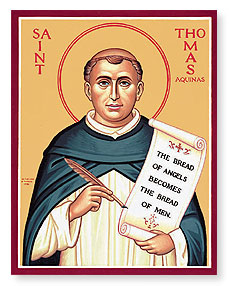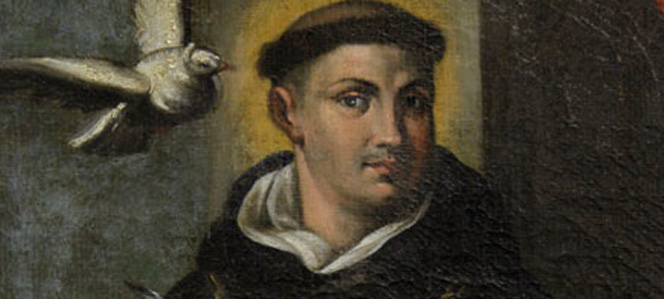America Needs You, Thomas Aquinas
By Rev. Robert Barron
 Just last week I was in Toulouse France, filming for my ten part documentary on Catholicism. I will admit that I was in Toulouse for fairly personal reasons. In the Dominican church of the Jacobins, in a golden casket situated under a side altar, are the remains of my hero, St. Thomas Aquinas. I spent a good amount of time in silent prayer in front of Thomas’s coffin, thanking him for giving direction to my life. When I was a fourteen year old freshman at Fenwick High School, I was privileged to hear from a young Dominican priest the arguments for God’s existence that Thomas Aquinas formulated in the thirteenth century. I don’t entirely know why, but hearing those rational demonstrations lit a fire in me that has yet to go out. They gave me a sense of the reality of God and thereby awakened in me a desire to serve God, to order my life radically toward him. I’m a priest because of God’s grace, but that grace came to me through the mediation of Thomas Aquinas.
Just last week I was in Toulouse France, filming for my ten part documentary on Catholicism. I will admit that I was in Toulouse for fairly personal reasons. In the Dominican church of the Jacobins, in a golden casket situated under a side altar, are the remains of my hero, St. Thomas Aquinas. I spent a good amount of time in silent prayer in front of Thomas’s coffin, thanking him for giving direction to my life. When I was a fourteen year old freshman at Fenwick High School, I was privileged to hear from a young Dominican priest the arguments for God’s existence that Thomas Aquinas formulated in the thirteenth century. I don’t entirely know why, but hearing those rational demonstrations lit a fire in me that has yet to go out. They gave me a sense of the reality of God and thereby awakened in me a desire to serve God, to order my life radically toward him. I’m a priest because of God’s grace, but that grace came to me through the mediation of Thomas Aquinas.
As I prayed before the tomb of Aquinas, I found myself ruminating on the importance for our own time of the one whom the church calls its “common doctor.” What can this thirteenth century Dominican master teach us? First, Thomas Aquinas saw with utter clarity that since all truth comes from God, there can never be, finally, any conflict between the data of the sciences and the facts of revelation. In his own time, there were advocates of the so-called “double truth theory,” which held that the “truths” of philosophy and science were in one category and the “truths” of the faith in another. On this interpretation, one could hold mutually exclusive positions as long as one remained cognizant that the opposing views were in separate departments of the mind.
Well, Thomas saw this as so much nonsense and said so. Apparent conflicts between science and religion (to use our terms) are born of either bad science or bad religion, and they should compel the puzzled thinker to dig deeper and think harder. Following Augustine, Thomas said that if an interpretation of the Bible runs counter to clearly established findings of the sciences, we should move to a more mystical and symbolic reading of the Scriptural passage. How important this is today when forms of fundamentalism have given rise to a terrible rationalist counter-reaction. Biblical literalism—a modernism, alien to the patristic and medieval minds—produces a variety of views repugnant to physics, evolutionary biology, cosmology, etc. And this has led to the sequestration of some religious types and some scientific types into separate and mutually hostile camps. Thomas Aquinas would see how foolish and counter-productive this is for both science and religion. The faith, he claimed, should always go out to meet the culture with confidence, and the culture should see its own deepest aspirations realized in the faith.
Secondly, Thomas knew that the Creator God of the Bible is the only finally satisfying explanation for the existence of the contingent things of the world. He was deeply impressed by the actual existence of those things that do not contain within themselves the reason for their being. Clouds, trees, plants, animals, human beings, buildings, planets, and stars certainly exist, but they don’t have to exist. This means, he saw, that their being is not self-explanatory, that it depends, finally, on some primordial reality which does exist through the power of its own essence. This “necessary” being is what Thomas called “God.” He was moved by the correspondence between this philosophical sense of God and the self-designation that God gives in Exodus 3:14: “I am who I am.” How significant this is in our time when “new” atheists have raised their voices to dismiss belief in God as a holdover from a pre-scientific time. Thomas would remind the Christopher Hitchens and Richard Dawkins of the world that no scientific advance could ever, even in principle, eliminate the properly metaphysical question to which God is the only satisfying answer. God is not a superstitious projection of human need; rather, God is the reason why there is something rather than nothing.
Thirdly, Thomas Aquinas was a deep humanist, precisely because he was a Christian. He saw that since God became human in Christ, the destiny of the human being is divinization, participation in the inner life of God. No other religion or philosophy or social theory has ever held out so exalted a sense of human dignity and purpose. And this is why, Aquinas intuited, there is something inviolable about the human person. How indispensably important that teaching is in our era of stem-cell research, euthanasia, legalized abortion, and pre-emptive war, practices that turn persons into means.
Thomas’s bones lie in that golden casket in Toulouse, but his mind and his spirit, thank God, still inform the counter-cultural voice of the church.
